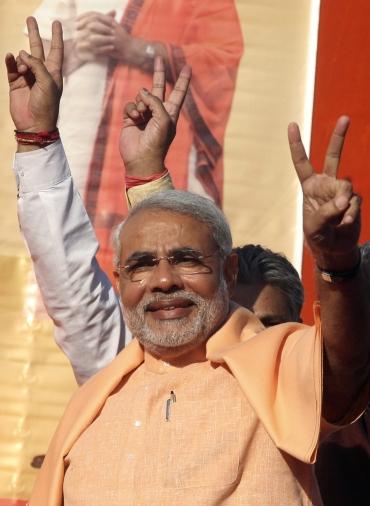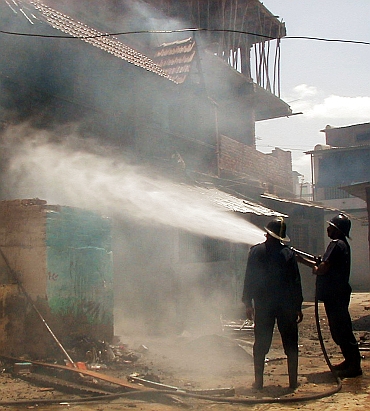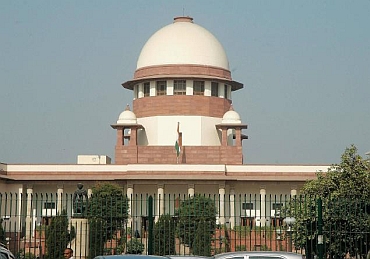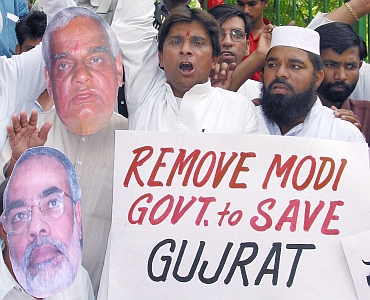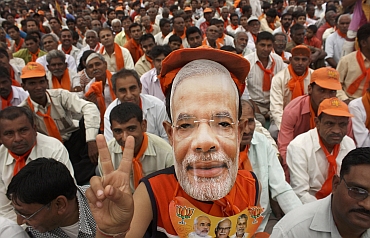 | « Back to article | Print this article |
'Modi has won a moral victory, but he cannot relax'
Since the 2002 communal riots in the state, Gujarat Chief Minister Narendra Modi has been targeted by victims of the riots, social activists, the secular lobby and the Congress for his action, inaction and perceived ideology of Hindutva.
Zakia Jafri, widow of former Congress member of Parliament Ehsan Jafri, who was killed by rioters and other victims, had approached the Supreme Court expressing distrust in the Gujarat police and the government.
In March 2008, the SC appointed a special investigation team to re-investigate the nine cases where horrendous crimes were committed against the minorities. In March 2010, the Special Investigation Team questioned Modi in the Zakia Jafri case. In February 2011, the team submitted its report to the SC but many social activists wrote and spoke against SIT chief R K Raghavan and also expressed distrust in the SIT's findings against Modi.
As a result the SC asked the new amicus curiae, Raju Ramachandran, in May to look into the SIT report, assess the evidence and see if any lapses were made. Ramchandran's confidential report was handed over to the SC in July.
In spite of two reports before it and in spite of monitoring the SIT for three years, the SC on Monday has sent the case back to the lower court. The apex court directed the trial court to examine the SIT report and the amicus curiae's review of that report and then decide whether a case needs to be registered to investigate Modi's alleged role in the 2002 case.
Sheela Bhatt attempts to answer frequently-asked question on this fascinating issue, which has legal, political, constitutional, communal, moral, regional and national dimensions.Click NEXT to read further...
'SC's silence helping Modi interpret order as his victory'
The judgment has three major implications. One, it has upheld the rights of potential accused (in this case Chief Minister Modi) and the rights of the petitioner (Zakia Jafri). Two, what the SC has refrained from saying is the bigger story. The SC's silence on certain issues is helping Modi to interpret the order as his victory. It is also helping Zakia because all doors are not closed for her. It's the case of the "glass half full" for both parties.
Three, Monday's order also reflects somewhat on the change of mood of the highest court of the land. The order is in some way passing the buck to the lower court. The SC has said, take the SIT's findings to the trial court and try Modi if the court admits the evidence.
On March 26, 2008, the SIT comprising five members headed by former Central Bureau of Investigation chief R K Raghavan, was constituted to probe nine riot cases.
From now on, SC has stopped monitoring it. This comes as a biggest relief for Modi, who was always sensitive and somewhat scared of the SC. Now, he finds himself in a stronger position as far as his fight with the 'secularists' is concerned, particularly when it comes to the media and the Congress.
Anand Yagnik, senior lawyer in Ahmedabad, says, "I think this is a poor judgment. If the highest court of the land cannot deliver the order on the basis of the SIT and amicus curiae's report, then how can you expect the lowest court to decide the case against Modi?"
Many legal experts are of the view that this may be construed as a victory for Modi.
SC has put the ball back in trial court
However, justifiably a question was raised -- when around 1,000 innocent people are killed then someone, somewhere and somehow in government should be made responsible. The Indian State should not look like a banana republic. The command and control structure to keep the peace should be fixed. Whoever fails in law and order in times like riots should be made accountable.
People fighting against Modi wanted the court to make him accountable for failing to maintain law and order and protect the minorities.
After hearing about the SIT's probe, the highest court of the land has gone back to the rulebook by saying that let the due course of law take place. This is a reminder of elementary law. The judgment indirectly conveys that the highest court of land has refused to take a decision in the Zakia case or on the differing versions of the SIT or amicus curiae. It has sent the ball back to where it normally goes in the Indian legal system.
'SC has not declared potential accused as innocent'
The SC could have easily cleared the case against Modi. The SIT was the apex court's baby. The SC had faith in it. There was nothing to prevent the SC from accepting the SIT's report, rejecting the amicus curiae Ramachandran's version and ending the matter.
It was leaked to the media that the SIT report has absolved Modi while Ramchandran's reports, though unconfirmed, has raised a few points that questions Modi's decisions and indicts the bureaucracy.
The SC, in its wisdom, has followed the conventional view and sent the SIT report to the magistrate. There is one case pending in the session court related to the Gulbarg society. But, the case against Modi is likely to go to the lower court where the concerned magistrate will evaluate the SIT's findings.A senior lawyer connected to the SC case, who has played an important role in trying to indict Modi in the riots cases, told rediff.com, "This is a correct order. The SC could have cleared the case. After all, this is not a normal criminal case. The Gujarat high court had dismissed Jafri's petition to file an FIR against Modi. To satisfy its judicial conscience it formed the SIT. The case against Modi was further investigated. Then, Ramachandran was asked to assess the evidence on record.
"The SC could have very well rejected Ramachandran's assessment and accepted the SIT report. But, it has taken care to see that the trial court takes into account the potential accused's version. If, the SC would have ordered an FIR, Modi would have been forced to resign. Without cross-examining Modi it would have been a difficult decision to justify. So, the SC has taken care of the rights of the potential accused, but it doesn't mean that he has been declared innocent."
'Gujarat Congress to gain from SC verdict'
The Gujarat Congress will but the Congress leaders in New Delhi won't. The Gujarat Congress has got a breather. The political fallout of the Supreme Court order will help the Gujarat Congress. A senior Congress leader and an office-bearer who has once held charge of Gujarat said, "If the SC ordered, as per petitioner Zakia Jafri's wish, the SIT to file an FIR report against Modi, we would have won the moral battle but would have lost the political battle."
This in a nutshell is the dichotomy, the brutish reality and the twisted logic of mass appeal of the man at the centre of the controversy. An FIR against Modi would have revived the ghost of 2002 riots which, whether one likes it or not, has a different political and social connotation in Gujarat. Congress leaders fear that any kind of Hindutva wind, strong or soft, doesn't help their party.
Gujarat's political scene gets polarised in no time when any question of Hindu identity comes up for public debate. The Gujarat Congress doesn't have a formidable leadership to counter Modi's charisma and tactics to keep voters under his hold.
In view of the few corruption charges emerging against Modi and the perception that he has helped a few rich industrialists unjustifiably, the Congress wants to corner Modi on the issue of corruption and doesn't want hefty ideals of secularism to be debated in society when it is going to the polls in 2012. After Monday's judgment, the first SMS that came to the media was from a senior Congress leader from Gujarat that said, 'Thanks to the SC, the Gujarat Congress is saved.'
The filing of the FIR would have been sensational and historic but Gujarat's Congressmen privately think would help the party, but only outside the state. They feel the issues of growth, development and the opportunity to make money are more important for Gujarati voters. The Congress has not been able to sell its idea of secularism to Modi's supporters. The Gujarat Congress's stupendous political failure is that it does not have the credibility to take the debate of communal-secular issues to a higher moral ground to make people see the truth behind the violence of 2002 and values of secularism needed in Indian democracy.'Harsher SC order would have benefited Modi politically'
Modi is greatly relieved; for him it's a moral victory. The SC is no longer watching him on a day-to-day basis. This helps him in his plan to conquer New Delhi. But, Modi would have gained politically by declaring himself a victim if the SC order would have been harsher in any way. In Gujarat, he would have cried foul.
Given the situation now, the Congress has a 'level playing field' because Hindutva sentiments won't be in the forefront. Modi is likely to take a balanced approach. He will ask his party in New Delhi to go to town saying that he has got a clean chit, but he is likely to take Ramchandran's report seriously and will prepare for part two of the legal battle. He can rejoice now but he can't take it easy.
He will need a battery of lawyers to see that he secures a final victory so that he does not have to use Hindutva sentiment to win votes. Modi's legal journey is very important keeping in mind his political ambitions. Only when he wins a legal battle and gets rid of the 2002 riots stigma, will he have a level playing field within his party, vis-a-vis other National Democratic Alliance leaders like Nitish Kumar and against Congress General Secretary Rahul Gandhi.
